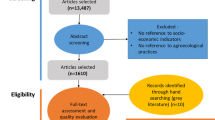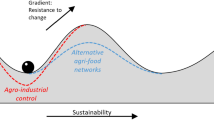Abstract
BIOS and BIFS are two California-based, small-scale alternative agricultural demonstration programs that define an applied Agriculture Partnership Model of extension. This model operates through a structure of local project leadership, a process of responsive farmer outreach and a primary goal of voluntary pesticide reduction. It reaches back to a Land Grant approach to extension of personal relationship, equal partnership, and collaborative learning. Overall findings from a systematic assessment of BIOS and BIFS imply that the operation and impacts of these two Agriculture Partnership Projects owe more to the model, approach, and values of the projects than to any specific farming or extension techniques. A model of local partnership and responsive, learner-centered outreach, operational values such as flexibility and relationship, and a balanced systems approach to farm management and project operation combine to create a promising organizational response to the rapidly changing regulatory, environmental, and political circumstances confronting conventional farmers in California. Though some farm advisors and field research specialists within the University of California Cooperative Extension have successfully used the projects to leverage decreasing Extension resources, increase their one-on-one contact with farmers, and learn new outreach and agricultural skills, others within that system are highly critical of the two projects. Organizational tension between Cooperative Extension and the quasi-university Partnership Projects largely reflects differences in fundamental beliefs and values about legitimate knowledge, learning processes, and effective teaching as well as primary goals for agricultural outreach.
Similar content being viewed by others
References
CAFF (1997). Year End Almond Report, BIOS. Community Alliance with Family Farmers. Davis, California.
Glaser, B. G. and A. Strauss (1967). The Discovery of Grounded Theory Strategies for Qualitative Research. Chicago, Aldine Pub. Co.
Guba, E. and Y. Lincoln (1981). Effective Evaluation: Improving the Usefulness of Evaluation Results through Responsive and Naturalistic Approaches. San Francisco: Jossey-Bass.
Hendricks, L. C. (1995). “Almond growers reduce pesticide use in Merced County field trials.” California Agriculture 49(1): 5–10.
Ohmart, C. P. (1997). Lodi-Woodbridge Winegrape Commission's Biologically Integrated Farming System for Winegrapes, Annual Report: 10/1/96 to 10/30/97. Lodi-Woodbridge Winegrape Commission. Lodi, California.
Peters, S. (1996). Cooperative Extension and the Democratic Promise of the Land-Grant Idea. St. Paul, Minnesota: Minnesota Extension Service.
Strauss, A. and J. Corbin (1990). Basics of Qualitative Research: Grounded Theory Procedures and Techniques. Newberry Park: Sage.
Author information
Authors and Affiliations
Rights and permissions
About this article
Cite this article
Pence, R.A., Grieshop, J.I. Mapping the road for voluntary change: Partnerships in agricultural extension. Agriculture and Human Values 18, 209–217 (2001). https://doi.org/10.1023/A:1011183810989
Issue Date:
DOI: https://doi.org/10.1023/A:1011183810989




